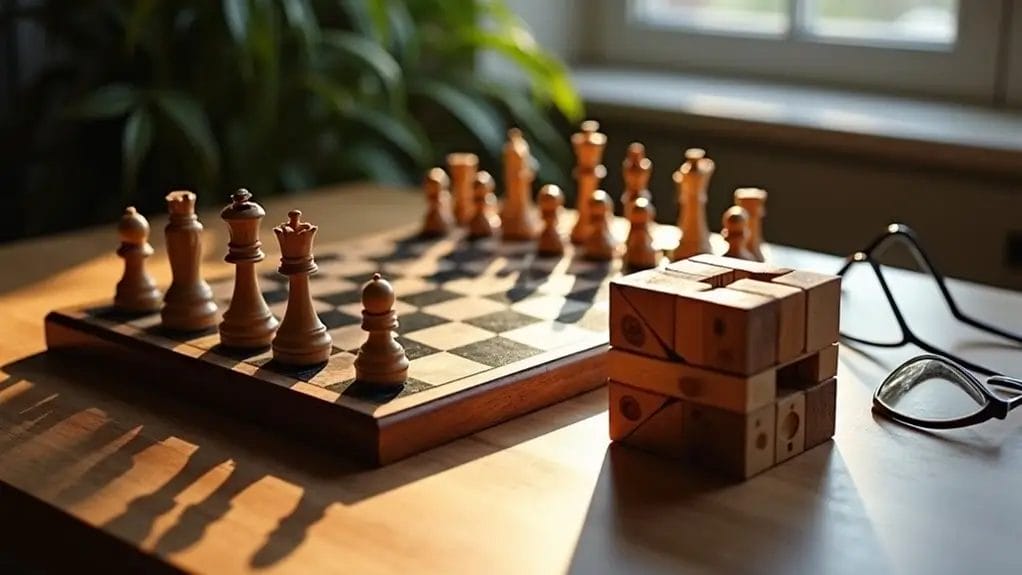
Do you want to boost your cognitive abilities? Choosing the right brain game can significantly affect your mental fitness. Research shows that different games target specific neural pathways. Some games enhance memory skills, while others sharpen problem-solving skills or improve reaction time.
Before investing time in a game, you must identify which cognitive functions you want to strengthen. Understanding how various gaming formats can help you achieve those goals is also important.
Key Takeaways
- Crossword and Sudoku improve memory and keep your mind sharp.
- Rummikub and Scrabble enhance language, math skills, and decision-making.
- Apps like Lumosity and Peak offer short, personalized exercises for various mental functions.
- Action games improve visual attention and spatial awareness. RPGs enhance memory through storytelling.
- The best games adjust to your skill level, track progress, and challenge multiple cognitive skills.
Why Are Games Good for Your Brain?

Many people view gaming solely as entertainment. But scientific research reveals compelling evidence for its cognitive benefits.
Brain games actively stimulate neural pathways. They enhance cognitive function across multiple domains. These activities can improve memory, sharpen attention, and boost problem-solving capabilities.
Studies show that regularly playing mentally challenging games can help delay age-related cognitive decline. This delay can be as much as 46% over seven years.
Regular practice of just 10 minutes twice daily activates underutilized brain circuits. This particularly benefits adults aged 35-95.
Physical exercise strengthens muscles. Similarly, brain games build mental reserves and maintain cognitive robustness.
Characteristics of a Brain-Boosting Game
To maximize cognitive benefits, effective brain-training games must incorporate specific design elements:
- Engages Critical Thinking: Encourages logical reasoning, problem-solving, and decision-making.
- Improves Memory: Incorporates activities that enhance long-term memory and short-term memory retention.
- Promotes Focus and Attention: Requires sustained concentration and minimizes distractions during gameplay.
- Encourages Learning: Introduces new concepts, vocabulary, or skills to stimulate mental growth.
- Adaptable Difficulty Levels: Offers progressive challenges to match the player's skill level and keep engagement high.
- Fosters Creativity: Includes tasks that need imagination, brainstorming, or out-of-the-box thinking.
- Encourages Pattern Recognition: Involves identifying sequences, similarities, or connections to train analytical skills.
- Enhances Decision-Making: Provides scenarios where quick and accurate choices are necessary.
- Interactive and Engaging: Keeps players motivated through rewards, feedback, or competitive elements.
- Supports Multitasking: Includes activities that need juggling multiple tasks or priorities.
- Measurable Progress: Tracks improvement over time to motivate continued play and development.
What Is the Best Game for Your Brain? 7 Top Types
You'll find many distinct categories when choosing the best brain games for your brain health.
1. Puzzle Games

Puzzle games represent a powerful category of brain-training activities. They simultaneously engage in many cognitive functions.
Research confirms that crossword puzzles enhance memory test performance. They also help reduce brain shrinkage in individuals with mild cognitive impairment.
Number puzzles or games like Sudoku strengthen your planning skills and concentration.
Wooden jigsaw puzzles uniquely stimulate both brain hemispheres. They combine logical thinking with creative problem-solving.
Each puzzle type offers distinct benefits. They're essential tools for thorough brain training and mental fitness.
2. Strategy Games

Strategic gameplay represents one of the most effective forms of cognitive enhancement. They offer significant improvements in critical thinking and problem-solving capabilities.
Classic games like chess and Sagrada actively engage your brain's executive functions. Other games like Rummikub and Scrabble strengthen both linguistic and mathematical processing.
Studies confirm that consistent engagement with strategy games boosts memory and brain function. You can improve your attention span and mental acuity.
The competitive nature of these games challenges you to refine your decision-making skills. This continual improvement contributes to sustained cognitive development.
3. Brain Training Games and Apps

Modern brain training apps offer a digital approach to mental enhancement.
Top-rated platforms like Lumosity and Peak focus on essential cognitive skills through adaptive daily exercises.
Happy Neuron focuses on five key brain areas. These include memory, attention, language, executive functions, and visual/spatial processing.
Research shows that just 10 minutes of daily practice can help delay cognitive decline. For those on a budget, My Brain Trainer offers an affordable alternative. It still provides extensive brain-training features.
These apps offer a personalized approach that guarantees you're consistently challenged. This helps provide superior mental stimulation.
4. Video Games

Similarly, modern video games emerge as powerful tools for mental stimulation. Strategy and puzzle games sharpen your problem-solving abilities and critical thinking.
Action games enhance your visual attention and spatial awareness. RPGs boost memory retention through complex narratives and character development.
Games like Tetris challenge your brain with time-sensitive problem-solving. Meanwhile, multiplayer platforms help valuable social interaction.
Video games offer a range of cognitive benefits. They target different aspects of mental performance. This includes skills like spatial reasoning and strategic planning.
5. Memory Games

Memory games represent one of the most effective categories of cognitive training tools. Extensive research supports this, demonstrating their impact on information retention and recall abilities.
Traditional options like Concentration and Simon Says deliver proven benefits for cognitive functions.
Modern brain training apps offer personalized experiences that adapt to your skill level.
These digital platforms track your progress. You can improve your memory through consistent practice.
Research shows that regular engagement can help prevent cognitive decline, particularly in older adults.
6. Physical and Interactive Games

Physical and interactive games offer distinct cognitive advantages. They simultaneously engage many brain regions through tactile manipulation and strategic thinking.
Games like jigsaw puzzles and Rubik's Cube enhance your problem-solving abilities. Meanwhile, they develop spatial reasoning skills through hands-on interaction.
Playing physical games like chess activates complex cognitive abilities. This includes skills like memory retention and strategic thinking.
Games such as Sagrada and Rummikub challenge your decision-making processes. They need resource management and adaptable strategies. Additionally, emotional intelligence card games strengthen your interpersonal skills while maintaining mental stimulation.
7. Social Word Game

Social and word games provide another effective way to enhance cognitive abilities.
Games like crossword puzzles and Scrabble strengthen your verbal skills. Meanwhile, they promote sustained cognitive engagement through varied difficulty levels.
Regularly playing social word games improves memory retention. They also help reduce age-related cognitive decline, such as dementia.
These games are particularly effective due to their dual impact. They enhance vocabulary and foster interpersonal connections.
Tips for Getting the Most Out of Brain Games
To maximize the cognitive benefits of brain training, implementing strategic practices can greatly enhance your results.
Dedicate at least 10 minutes twice daily to brain games. Focus on diverse activities that boost memory and multiple cognitive functions.
Engage with friends in brain-training challenges to maintain motivation and accountability. This social aspect makes the experience more enjoyable and fosters healthy competition.
Select games targeting different skills like memory, attention, and problem-solving. Track your progress regularly to identify areas needing improvement.
Conclusion
Choosing the right brain game depends on your specific cognitive enhancement goals. To maximize benefits, select games that target multiple neural pathways. These games should offer increasing difficulty and provide measurable performance metrics.
Whether you use strategy games or puzzles, it's important to engage consistently. Tracking your cognitive improvements with measurable benchmarks will help promote neuroplastic development.
FAQs
What Is the Best Game to Stimulate Your Brain?
You'll get ideal brain stimulation from Lumosity. It scientifically targets memory, processing speed, and problem-solving. The adaptive games in it track your progress. Meanwhile, it delivers measurable cognitive improvements through customized daily training exercises.
Which Game Can Increase IQ?
You'll boost your IQ through strategic games like chess, Lumosity, and Sudoku. Studies show these activities enhance memory, processing speed, and problem-solving skills. Users can experience up to a 46% reduction in cognitive decline through regular practice.
Which Game Improves Memory?
Crossword puzzles greatly boost memory function, as proven by clinical studies. Lumosity's scientifically-designed exercises and Sudoku also enhance your working memory.
How Do I Fully Activate My Brain?
You'll maximize brain activation through combined activities: regular cognitive training, physical exercise, sufficient sleep, and social engagement. Incorporate memory games, problem-solving tasks, and diverse learning experiences into your daily routine.